

Joe Sacco on The Great War: 'Trench warfare shocked me even as a kid' We're accustomed to seeing Joe Sacco as he caricatures himself in his comic books: round spectacles that are glazed over, big lips, woolly hat, shoulder bag, usually scouring a chaotic conflict zone in an effort to get behind the headlines.

Sacco's latest work, The Great War, is a departure from journalistic bestsellers such as Palestine and Safe Area Gorazde. For one thing, he's not in it – or at least he doesn't think he is, though he acknowledges he could have subconsciously drawn himself in at some stage. It's easy to get confused. Joe Sacco take 2: war pic. Joe Sacco take 2: war pic. Joe Sacco take 2: war pic. Joe Sacco take 2: war pic. Joe Sacco's Great War graphic tableau becomes giant Paris metro poster. Joe Sacco's epic, 24-ft-long depiction of the first day of the battle of the Somme has been recreated on the wall of the Paris metro.
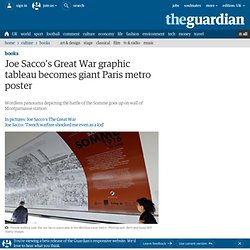
Published last autumn, the acclaimed cartoonist's wordless panorama The Great War picked out the events of the first world war battle, which began 98 years ago on 1 July, from the British soldiers who went over the top, to the mass burials of the dead. It drew glowing reviews on publication. Steve Rose called it "a cross between Hergé and the Chapman brothers; the Bayeux Tapestry as a silent movie" in the Guardian. Sacco himself has said the work was inspired by the Bayeux Tapestry. "It all started when I was playing darts with a friend of mine in New York," he told AFP.
Now the comic is being shown in the Montparnasse metro station in Paris in a display which runs to 130 metres. He told Le Monde that the fresco was trying to show "the scale of what happened that day". Joe Sacco. Info: Your browser does not accept cookies.
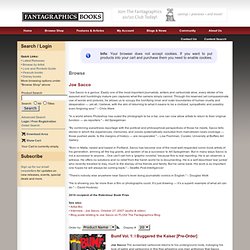
If you want to put products into your cart and purchase them you need to enable cookies. Joe Sacco "Joe Sacco is a genius. Easily one of the most important journalists, writers and cartoonists alive, every stroke of his assured and humblingly mature pen captures what the camera simply cannot. Through his reserved yet compassionate use of words and pictures, he allows us to occupy the horrifying inner and outer boundaries of human cruelty and desperation — yet all, I believe, with the aim of returning to what it means to be a civilized, sympathetic and possibly even forgiving soul.
" – Chris Ware "In a world where Photoshop has outed the photograph to be a liar, one can now allow artists to return to their original function — as reporters. " – Art Spiegelman "There's nobody else anywhere near Sacco's level doing journalistic comics in English. " – Douglas Wolk "He is showing you far more than a film or photographs could. Joe Sacco. Biography[edit] Sacco earned his B.A. in journalism from the University of Oregon in 1981 in three years.
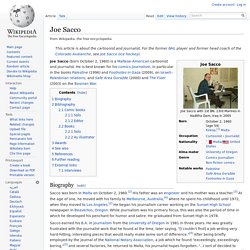
He was greatly frustrated with the journalist work that he found at the time, later saying, "[I couldn't find] a job writing very hard-hitting, interesting pieces that would really make some sort of difference. "[4] After being briefly employed by the journal of the National Notary Association, a job which he found "exceedingly, exceedingly boring,"[3] and several factories, he returned to Malta, his journalist hopes forgotten. "...I sort of decided to forget it and just go the other route, which was basically take my hobby, which has been cartooning, and see if I could make a living out of that," he later told the BBC.[5] Eventually returning to the United States, by 1985 Sacco had founded a satirical, alternative comics magazine called Portland Permanent Press in Portland, Oregon. Sacco currently lives in Portland, Oregon.[8] Bibliography[edit] Comic books[edit] Aspen no. 5+6, item 3: Three Essays. Every era has to reinvent the project of "spirituality" for itself.
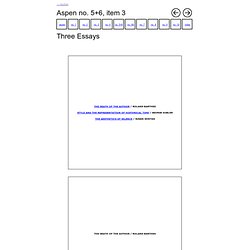
(Spirituality = plans, terminologies, ideas of deportment aimed at the resolution of painful structural contradictions inherent in the human situation, at the completion of human consciousness, at transcendence.) In the modern era, one of the most active metaphors for the spiritual project is "art. " The activities of the painter, the musician, the poet, the dancer et al, once they were grouped together under that generic name (a relatively recent move), have proved to be a peculiarly adaptable site on which to stage the formal dramas besetting consciousness, each individual work of art being a more or less astute paradigm for regulating or reconciling these contradictions. Of course, the site needs continual refurbishing.
Whatever goal is set for art eventually proves restrictive, matched against the widest goals of consciousness. Therefore, art comes to be estimated as something to be overthrown. Marshall McLuhan - Out of Orbit: The Life and Times of Marshall McLuhan (1999) Duration: 45 minutes "Societies have always been shaped more by the nature of the media with which people communicate than by the content of the communication.
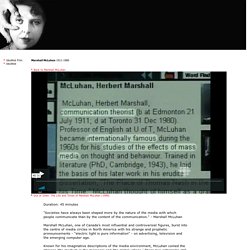
" - Marshall McLuhan Marshall McLuhan, one of Canada's most influential and controversial figures, burst into the centre of media circles in North America with his strange and prophetic pronouncements - "electric light is pure information" - on advertising, television and the emerging computer age. O U T S I D E R S : Assorted Street Posters. Turnitin - Originality Check, Online Grading & Peer Review.